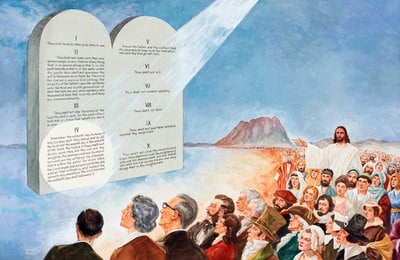Daily Lesson for Thursday 4th of September 2025
God instructed Moses on every detail in preparation for the tabernacle’s services. Priests were to have priestly garments, but the high priest wore a special ephod, which contained the names of the sons of Israel. He also wore a breastplate, which contained the Urim and Thummim and was to be on his heart (Exodus 28:1-43). All priests were to be consecrated (Exodus 29:1-46). Other items to be carefully prepared were the altar of incense, the basin for washing, the anointing oil, and the incense (Exodus 30:1-38).
Read Exodus 31:1-18. What special assistance did God give so that all the tabernacle’s details and related services would be prepared and built in a beautiful and proper way?
For the first time in the Scriptures, one reads that God would fill a person with the Spirit of God. What does that mean? Bezalel was empowered to work artistically on the tabernacle. He was filled, i.e., equipped with new skills, understanding, and knowledge on the needed craftsmanship. Additionally, God gave Aholiab and many other craftsmen the same Spirit to assist in this work.
In the midst of all this creativity, God’s Sabbath is presented as a sign between God and His people that the Lord makes them holy. It means that the observance of the fourth commandment is associated with sanctification. Ezekiel later observed: “ ‘I gave them my Sabbaths, as a sign between me and them, that they might know that I am the Lord who sanctifies them’ ” (Ezekiel 20:12, ESV).
The Sabbath is a reminder that the Lord is not only our Creator (Genesis 2:2-3), Redeemer, and God (Deuteronomy 5:15; Mark 2:27-28) but also the Holy One. He transforms people by His presence; through His Spirit and Word, they grow to reflect a loving, kind, unselfish, and forgiving character.
The culminating present that God gave to Moses was the Decalogue (Exodus 31:18). God Himself wrote and gave the two stone tablets with the ten precepts (Exodus 31:18, Deuteronomy 9:9-11). These tablets were to be placed in the Most Holy Place and inside the ark of the covenant, which was under the mercy seat (Exodus 25:21).
|
The phrase “mercy seat” comes from one Hebrew word, whose root meaning is “to atone.” Why, then, would this “mercy seat” be set right over God’s law? What hope should we see in this fact? |
 (1)
(1)Source: https://ssnet.org/blog/25c-10-filled-with-the-spirit-of-god/




